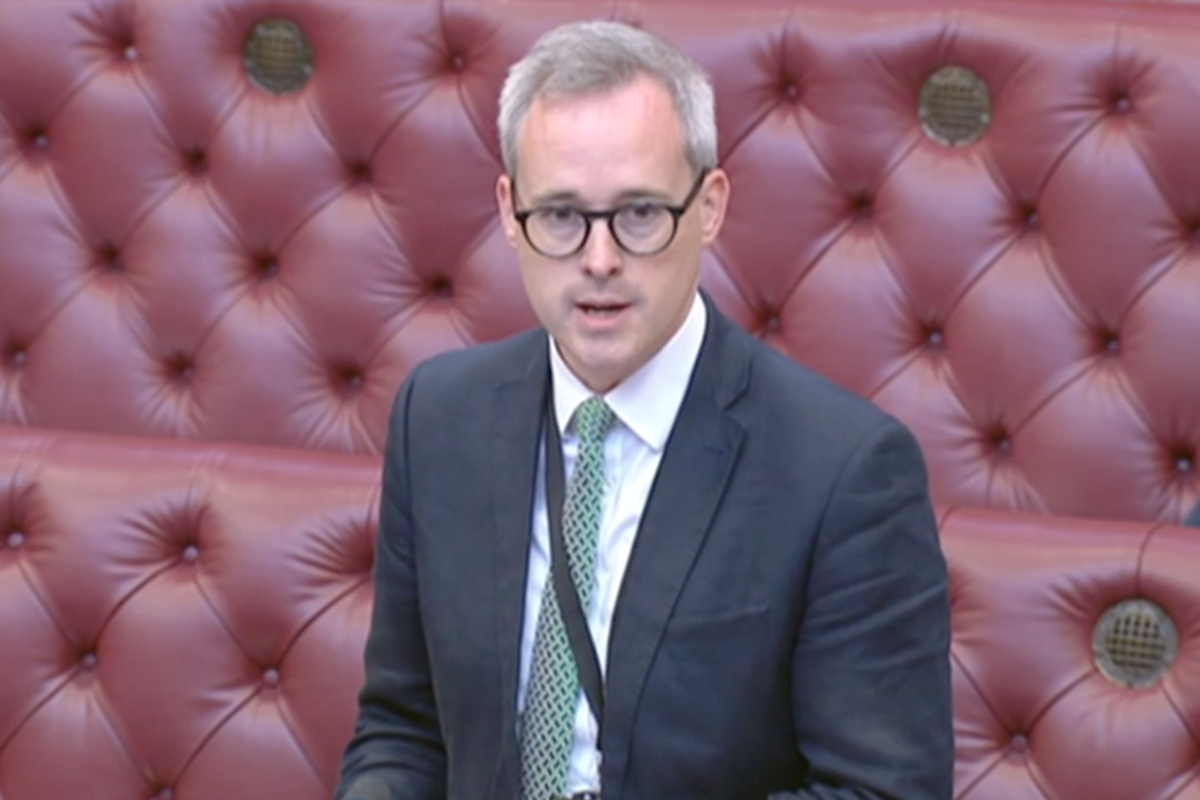
DCMS Minister Lord Parkinson responded to comments during Friday's debate
Photo: UK Parliament
House of Lords debates creative industries policy
Peers say government must consider skills development, careers guidance and research and development tax relief in discussion on creative industries policy developments.
Members of the House of Lords discussed recent policy developments announced by government that impact the creative industries on Friday (7 July).
Tabled by Chair of the House of Lords Communications and Digital Committee, Baroness Stowell of Beeston, the debate followed publication of the committee’s own report into the creative industries in January, which warned government complacency risked undermining the UK’s creative industries.
Peers welcomed the government’s newly released Creative Industries Sector Vision and the uptake of a series of recommendations from the committee’s report, including maintaining funding for the Creative Clusters programme and making the creative industries one of the UK’s priority economic growth areas.
READ MORE:
But the debate called for some areas, such as skills development and careers guidance, to be given additional focus, while also lobbying for government to extend eligibility to research and development (R&D) tax relief to the creative industries.
Opening the debate, Baroness Stowell said the level of political attention recently given to the creative industries was “notable”.
“The Chancellor has now included the creative industries in the UK’s priority economic growth areas. The sector vision has a foreword from the Prime Minister,” she said.
“These changes matter, and industry will be paying attention.”
Skills development
Several peers discussed the need for a skills plan to ensure the government’s target of creating an extra 1m jobs in the creative industries by 2030 is met.
Meanwhile, others said educational policy needs to consider STEAM, not STEM, by prioritising creative subjects alongside science, technology, engineering and maths.
Baroness Stowell called for more work to scale up creative apprenticeships such as the flexi-job model and said more clarity on what is happening with careers guidance was needed: “The sector vision refers to ‘inspiring creative careers guidance’, but does not say much about what that actually means,” she added.
She continued by saying government and the creative industries must “work even harder to gain some mutual understanding” when discussing skills and education".
Lord Parkinson of Whitley Bay, DCMS Parliamentary Under-Secretary of State, responded by confirming work tackling skills gaps and shortages is underway.
“It requires significant evidence and data, which is another area on which we are working with the Department for Education (DfE),” he said.
“Our understanding of the creative industries through evidence and data is constantly expanding. Where gaps remain, such as forecasting skills needs, the DfE’s Unit for Future Skills is working to fill them.”
He added the Creative Industries Council has committed to “delivering subsector skills reviews over the next year, giving a clearer picture of the gaps and shortages particular to each subsector of the creative industries”.
R&D for tax allowance
Several peers said government should expand eligibility for research and development (R&D) tax credits to include the creative industries.
R&D tax relief currently supports companies that work on innovative projects in science and technology, allowing them able to claim Corporation Tax relief if their projects meet the standard definition of R&D.
The arts and humanities is currently not eligible for R&D tax relief. In their report published earlier this year, the Communications and Digital Committee said eligibility should be extended to creative industries, noting that other OECD countries have a wider definition of R&D tax reliefs that benefits their creative sectors.
However, the suggestion was rejected by government in its response to the report, published in April.
In Friday’s meeting, Baroness Stowell said R&D tax relief “remains overly restrictive and excludes a large proportion of work in the creative sector”.
“I appreciate of course that we cannot distribute endless tax cuts, but we can double down on our strengths and at least explore further options for stimulating more innovation,” she added.
“I reiterate the committee’s call for the government to look at this issue more seriously by expanding the definition of R&D. A limited pilot could be a good start.”
Lord Watson of Invergowrie added the current R&D relief system “does not recognise the work done by the creative industries to improve the UK’s economy, through the live music ecosystem, the recording industry and the tourism and hospitality sectors”.
“Most grass-roots music venues operate at a loss when supporting the development of upcoming talent, and their role as a research and development department of the music industry should be recognised by broadening the work that qualifies as R&D to include creative industries and grass-roots music venues,” he added.
In his response, Lord Parkinson said the house “will have to wait for a fiscal event” to hear about the government’s plans for future R&D relief systems.
“The UK is unique in having two R&D schemes: one for large businesses, and one for smaller businesses. Earlier this year, government ran a consultation which sought views on a simplified R&D tax relief scheme, merging the two schemes,” he said.
“The government are considering their response to the consultation and will publish draft legislation on a merged scheme for the technical consultation.”
Join the Discussion
You must be logged in to post a comment.